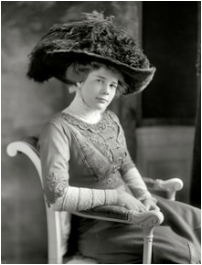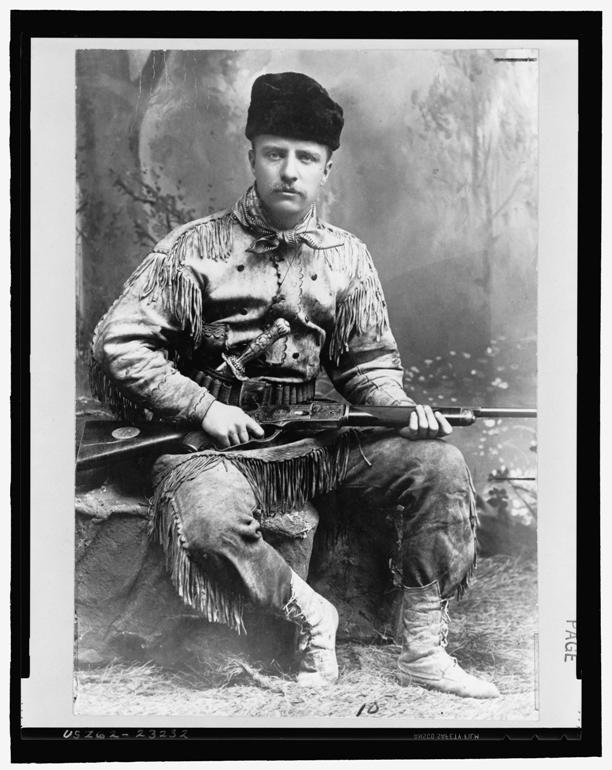|
Theodore Roosevelt is back in the news, since armed protestors occupied a national wildlife refuge in eastern Oregon, including land put aside for the ages by Theodore Roosevelt. The old Rough Rider would have had his own ideas how to disperse these intruders. I feel I have an insight into the strength (and temper) of Theodore Roosevelt, since his daughter once bawled me out. This was in 1974 when I wangled a tour of Sagamore Hill from Roosevelt’s second daughter, Ethel Derby, of Oyster Bay. Mrs. Derby was polite, and formidable and knowledgeable, but the interview almost ended in the first minutes when I referred to her father as “a hunter.” “Don’t think of him as a hunter,” Mrs. Derby said. “He was a conservationist. Sometimes he shot deer for food. He also helped classify many animals. But he was not a hunter. Young people who visit get the wrong impression.” I knew some of the trophies in the American Museum of Natural History had been donated by Roosevelt, whose father had been a founder of the museum. And a few heads and hides are now spread around the very male, very dark, family home Roosevelt had built. In 1974, his daughter was mad at me. I caught Joyce Dopkeen, the Times photographer, looking at me as if to say, “You are blowing this interview, dude.” Fortunately, Mrs. Derby was as gracious as she was loyal, and she continued the interview, her memory vital at 83. She made sure to tell me her father had made many positive gestures toward African Americans, and that she was from the liberal wing of the Republican Party. She also said kind words, but no excuses, about President Nixon, who had been kind to her, and was soon to resign because of the Watergate scandal. She was a tribute to her patrician father and mother, Edith Carow Roosevelt, her father’s good friend in childhood, whom he married two years after his first wife died in childbirth. My faux pas with Mrs. Derby has long dominated my memory of the interview. Last fall my wife and I were accorded a tour of Sagamore Hill through friends, Brian and Janet Savin of Connecticut, and I only vaguely remembered having been there with Mrs. Derby, decades earlier. I have since read “The Rise of Theodore Roosevelt,” the Pulitzer-Prize-winning book by Edmund Morris, which covers Roosevelt’s family life and early political years leading up to his replacing the assassinated President McKinley in 1901. Mrs. Derby’s father was a complicated man – brilliant intellectual skills, deft political operator, source to friendly reporters, high morals, but impetuous, often losing his temper even to close friends. After the first 600 pages, I went to the Web and found plenty of educated speculation that TR was bipolar. Morris also makes it clear that fellow Rough Rider volunteers were falling all around him as Roosevelt led the charge up San Juan Hill in Cuba in 1998. The best part of the book is about Roosevelt’s visceral love of the west – chasing down three rascals who stole his boat, resisting the suggestion he hang them, turning them over to a sheriff. In his first terrible months after the death of his first wife, Alice, he went to his ranch in the Dakota territory and shot just about anything that moved – “making his total bag 170 items in just 47 days,” Morris writes. I’m glad I didn’t have that statistic at hand when I interviewed Mrs. Derby, who passed three years later. Her father would have been proud of the way she scolded me – and the way she continued the interview, as she had promised.
bruce
1/11/2016 08:23:59 pm
George,
George Vecsey
1/11/2016 10:01:36 pm
Theodore Roosevelt to David Bowie? Wow.
bruce
1/11/2016 10:10:05 pm
george, 1/12/2016 03:56:08 pm
George
George Vecsey
1/13/2016 08:22:28 am
Alan, thanks for your comments. As I step back from it,I'm not sure that Morris explains how TR got his political ideas; perhaps they were in the DNA of a Knickerbocker Dutch elite in NYC. He showed overt prejudice against Irish Americans -- but that may be partly because of what he saw up close in Tammany Hall. He was pro-active for more compassion and equity for African-Americans. And he fomented for a war in Cuba, almost as an activity he needed, like hunting out west. Some people called him a madman on his way toward the White House. Psychological profiles a century later are conjecture, but interesting. Best, GV Comments are closed.
|
Categories
All
|











